For the past couple of years, we’ve come to expect the word ‘Google’ to accompany any news referring to changing algorithms or updates. Well, Facebook switched things up and made an announcement of their own earlier this year:
“Facebook was built to bring people closer together and build relationships. One of the ways we do this is by connecting people to meaningful posts from their friends and family in News Feed. Over the next few months, we’ll be making updates to ranking so people have more opportunities to interact with the people they care about. ”
In other words, the News Feed you’re used to seeing is about to change. And for those who don’t know what News Feed is, this one’s for you:
“News Feed is the constantly updating list of stories in the middle of your home page. News Feed includes status updates, photos, videos, links, app activity and likes from people, Pages and groups that you follow on Facebook.”
That being said, Mark Zuckerberg, the man behind Facebook, elaborated in a post, saying that one of the big focus areas for 2018 is making sure the time we spend on Facebook is time well spent. He continues by saying that they originally built Facebook to help people stay connected with those they care about, but recently public content like posts from businesses, brands and media is crowding out the personal moments that lead us to connect more with each other.
As you can probably guess, Facebook is changing News Feed to take it back to how it all began, with more content from your friends, family and groups, and less public content. Not that you won’t see public content, but the content that you do see will encourage meaningful interactions between people.
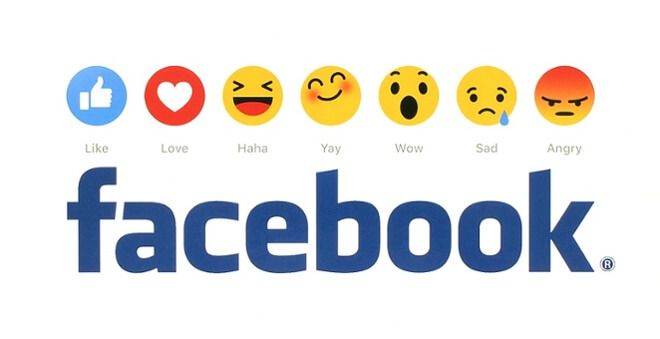
What Exactly Does This Change Mean?
Putting it all together, this is how things are playing out. Today, signals such as how many reactions, comments or shares a post gets determines how high they appear on News Feed. The update also prioritizes posts that spark the most conversations and meaningful interactions between people.
As for the how, Facebook predicts which posts you’re more likely to interact with based on its likes, comments and shares. These posts that inspire more back and forth discussions will then appear higher on your News Feed. They’re also prioritizing posts from friends and family that are consistent with their News Feed values:
- Friends and Family Come First: Facebook was built on the idea of connecting people with their friends and family.
- A Platform for All Ideas: They’re not in the business of picking which issues the world should read about.
- Authentic Communication: The strength of our community depends on authentic communication.
- You Control Your Experience: Ultimately, you know what’s most meaningful to you.
- Constant Iteration: They view their work as only 1 percent finished.
The end result is News Feed with less public content, including videos and other posts from publishers or businesses. This means a decrease in a Page’s reach, video watch time and referral traffic. Of course, the impact will differ from Page to Page, as contributing factors such as content type and how people interact with it are different for each Page. And if you still want to see posts from Pages you follow, no worries — go to your News Feed Preferences and choose ‘See First’ for that content.
Anyway, Page posts that generate a lot of buzz will also appear higher in News Feed. For example, live videos, which get about 6x as many interactions as regular non-live videos, will appear higher than other content types. ‘Engagement-bait’ posts, though, will be demoted. These are posts that goad users into interacting with likes, comments and shares, such as those that go along the line of: “Like if you love pizza, share if you love burgers, or comment if you love steak!”
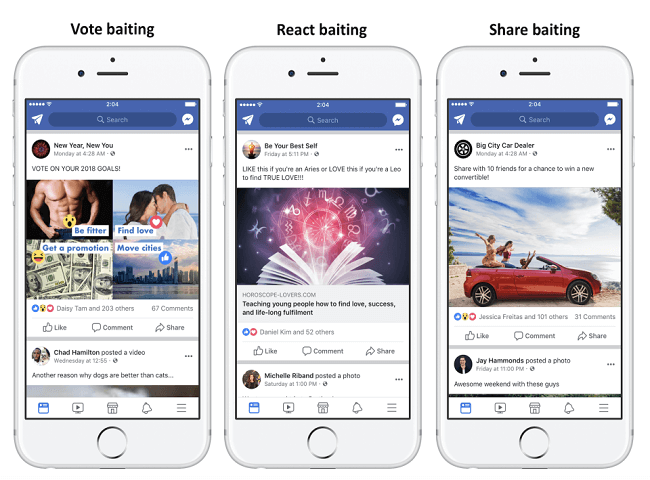
How Will Businesses or Advertisers Be Affected?
From the get-go, third-party organizations that post funny videos or memes, sell products, deliver news, etc., will take a big hit. Publishers who rely on Facebook for organic distribution of content, or pushing out articles without paying to appear in people’s News Feed, will also hurt. And as Fortune points out, “businesses may actually end up buying more online ads on Facebook to promote themselves, because simply creating content and attempting to share it on the news feed for free will no longer work as well as it once did.”
How Is the Ad Community Responding?
As for the ad community, here’s what they have to say:
“While Facebook’s move to prioritize friends’ content over ‘passive’ publisher and news outlet content may shock many marketers and agencies, we should fear not. In addition to not impacting the ad algorithm (for now), Facebook is striving to make its News Feed a place for meaningful and relevant connections. Brands need to take quick action with their Facebook content strategies to dig in to the data on “who” their fans are and what makes them tick so that brand content is synonymous with relevant content.” – Billy Boulia, DigitasLBi VP and Group Director of Social Strategy
“Facebook will continue to aggressively grow its Watch digital television platform and favor content in the News Feed from shows and live broadcasts. This suggests that Facebook is looking to lure advertisers to switch their marketing spend from TV to Facebook. Facebook’s goal must be to establish engaged communities who are watching and talking about the same events in real-time.” – Blaise Grimes-Viorrt, The Social Element, Chief Services Officer
“At times, Facebook is looking like MySpace, as it’s overcrowded, and my guess is other internal metrics show that usage is not tracking the right way…The impact of the News Feed (algorithm change) will be positive for user experience but terrible for brands, publishers and other third-party players. Having lived through the early days of Facebook as CEO of Appssavvy, I’ve seen the great power Facebook offers business, but also the threat, as simple changes on its side that impact algorithms can put small companies out of business.” – Chris Cunningham, Unacast, President
“Typically, up to one third of publisher referral traffic comes from Facebook. In the very short-term, publishers will need to back-fill that audience urgently. However, publishers are resilient and certainly used to the capricious nature of the media industry. More than ever, media companies are sensitive to being dependent any one source of traffic. Instead, they are building their own loyalty with their audiences. This is true across editorial categories.” – Todd Krizelman, MediaRadar, Co-Founder and CEO
Okay, Is Anything Else Going On?
So, is anything else going on? Indeed it is. After the initial announcement, Facebook made a second one about seeing more local news on News Feed:
“Our next update on our 2018 focus to make sure Facebook isn’t just fun but also good for your well-being and for society…
We’re making a series of updates to show more high quality, trusted news. Last week we made an update to show more news from sources that are broadly trusted across our community. Today our next update is to promote news from local sources.” – Mark Zuckerberg
To summarize, apart from favoring content from friends and family, Facebook is prioritizing local news so that users see topics that have a direct impact on them and their community. That’s not to say that you won’t see national news, you definitely will, but if you prefer that over the local variety, you can always choose which news sources you want to see at the top of your feed with their See First feature.
Final Thoughts
From Facebook’s POV, this change means that you no longer have to scroll through countless posts just to see the content you want to see. You’ll still see viral videos and the like, but they’ll take the back seat to your friends and family. From others’ POV, though, things may not work so well. The New York Times, for example, said that the “changes raise questions of whether people may end up seeing more content that reinforces their own ideologies if they end up frequently interacting with posts that reflect the similar views of their friends and family.”
Whatever this change will bring, only time will tell. Best of luck!
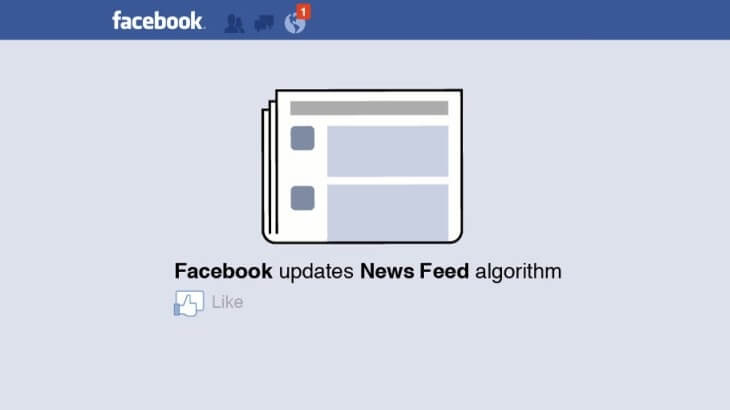
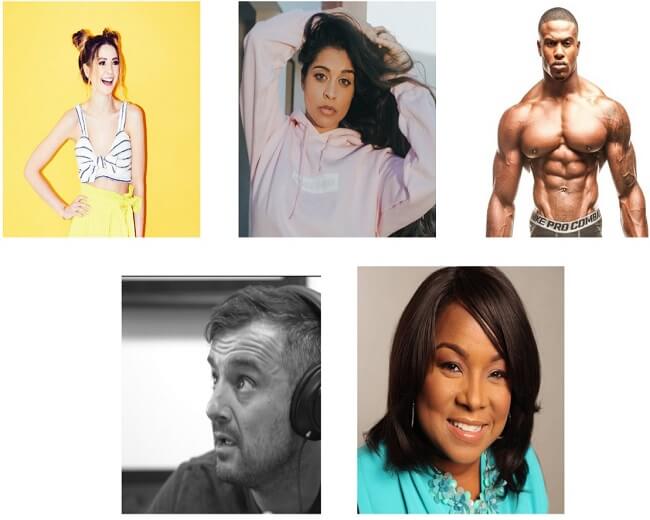
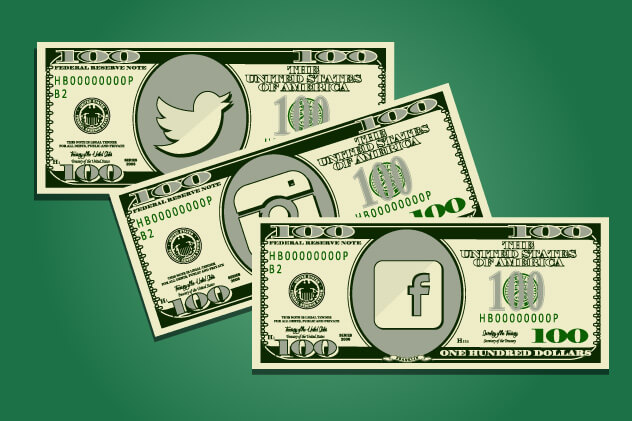


Tell us your thoughts in the comments